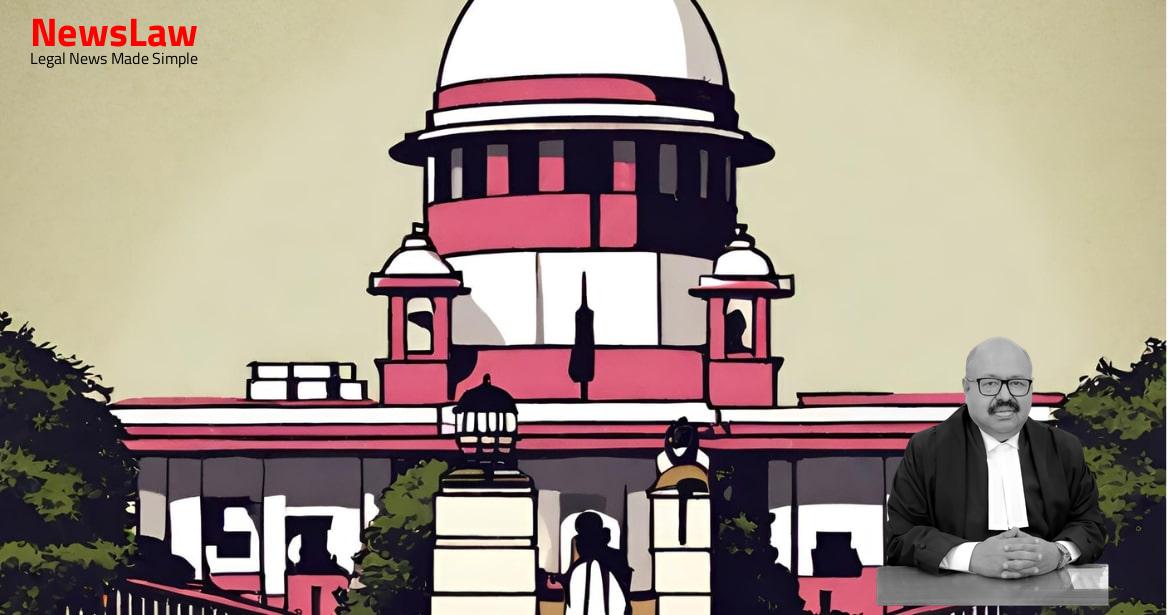The current civil appeals, under Section 125 of the Electricity Act, 2003, (hereafter, “the Act”) challenge orders of the Appellate Tribunal for Electricity (hereafter, “APTEL”), dated 06.12.2018 (“ first impugned order ”) and order dated 24.07.2020 (“ second impugned order ”). The Respondent No 3, Gujarat Electricity Regulatory Commission (hereinafter “the 4 in petition No 1363/2013 5 Civil Appeal No 1253/2019 by order dated 15.02.2019 3 State Commission”) is the regulatory commission under the Act, for the State of Gujarat. By Section 86 of the Act, State Commissions discharge several functions- which include the determination of tariff “for generation, supply, transmission and wheeling of electricity, wholesale, bulk or retail, as the case may be, within the State”.
Furthermore, Section 64 (6) prescribes that tariff orders “shall continue to be in force for such period as may be specified in the Tariff Order unless amended or revoked”. As regards this set of differentiating factors, the tariff advantage for government run and aided educational institutions do not appear to be based on geographical position or nature of supply. 5 for Renewable Energy Generation) Regulations, 2010 (hereafter “REC Regulations 2010”) were framed by the Central Commission for the development of a power market for non-conventional sources of energy by the issuance of tradable and saleable credit certificates (hereafter “RECs”).
– for the purpose of these regulations ‘Pooled Cost of Purchase’ means the weighted average pooled price at which the distribution licensee has purchased the electricity including cost of self generation, if any, in the previous year from all the energy suppliers long-term and short-term, but excluding those based on renewable energy sources, as the case may be.” The objective of the REC Regulations 2010 was to separate the physical electrical component and the environmental (renewable) component of the energy for issuance of RECs. Under the REC Regulations 2010, distribution licensees were not obliged to purchase the physical component of electricity from renewable energy generators set up under the REC mechanism since such REC based generators had alternative options with regard to the physical component of electricity, namely, (i) sale of electricity power exchanges (ii) wheeling of power for sale to third parties at mutually agreed rates or (iii) wheeling of power for their own consumption. The REC Regulations 2010 provided for floor price and forbearance price i.e. In the present case, the State Commission by its order determined the tariff for procurement of power by distribution licensees from wind energy generators and also ruled on other commercial issues for wind energy generators set up under a preferential tariff mechanism. Since the previous control period expired on 10th August, 2009, the Commission decides that the control period for this order will be 3 (three) years w.e.f. Further, obligated entities could fulfil their renewable purchase obligation through two sources: (a) Purchase of renewable energy directly (at preferential tariff determined by State Commission); and (b) Purchase of RECs at a market price between Floor Price and Forbearance price determined by Central Commission 11.
Also Read: https://newslaw.in/supreme-court/legal-analysis-of-claim-for-loss-of-profit-in-delayed-contract/
The alternate route available for the WPDs (such as RWE, Wish Wind etc.) at the time of entering into the PPA was to sell electricity at a promotional tariff of 3.56 per unit – as determined by the State Commission. They filed a petition 12 See Explanation to Regulation 5 of the REC Regulations 2010 which defines average pooled price as follows: “the weighted average pooled price at which the distribution licensee has purchased the electricity including cost of self-generation, if any, in the previous year from all the energy suppliers long-term and short-term, but excluding those based on renewable energy sources, as the case may be.” 13 14
The relevant amendment to Regulation 5 (c), reads as follows: “(2) In sub-clause (c) of clause (1) of Regulation 5 of the Principal Regulations, the words “at price not exceeding the pooled cost of the power purchase of such distribution licensee” shall be substituted with the words “at the pooled cost of power purchase of such distribution licensee as determined by the Appropriate Commission”.” The appellants preferred review petition against APTEL’s order rejecting their appeal against State Commission’s order; that too was dismissed by APTEL vide order dated 24.07.2020. Solar Semi-Conductors Power Limited Company (India) Private Limited to argue that if the State Commission re-determines the tariff amongst the parties, then the aggrieved party cannot be compelled to continue the said agreement or enter into a new agreement on such increased tariff. There was consequently no bar in any law or regulations for the parties 17 (2017) 14 SCR 115 18 APPC as clause 1.1 of the PPA is defined as: 12 to agree to such tariff and in fact, REC Regulations 2010 itself recognized that the PPA can be “ at a price not exceeding the pooled purchase cost ”. Doing so would not only be contrary to the express terms of the amended regulations but would also be contrary to the terms of the PPA which do not accommodate or provide for such change in regulations. It is argued that the National Action Plan on Climate Change and the Union Ministry of Power resolution dated 28-01-2016 and Tariff Policy underline the necessity of the co-generation of renewable sources of energy, progressively, so that it reaches a greater proportion.
The terms of the PPA were fully in 19 Dated 10.07.2013, which inter alia, stated that 14 compliance with the provisions of the REC Regulations 2010 as the restriction in those regulations was for the price not to exceed the Pooled Power Purchase Cost.
When the Central Commission clarified that for PPAs entered into prior to 11.07.2013, the tariff mutually agreed is valid for the entire duration of the PPA (25 years), the state commission and APTEL fell into error in substituting a new tariff at the instance of the WPDs/Respondents. The appellants urge that the Impugned Order is contrary to the decision of this court in Gujarat Urja Vikas Nigam Limited v Solar Semi-Conductors Power Company (Pvt) Ltd (Supra) holding that if the state commission re-determines the tariff, it cannot force the appellants to continue the PPAs or enter into a contract based on such increased tariff.
Sundaram argued – for the appellants that the plea of coercion or duress or unequal bargaining etc, raised by the WPDs was patently erroneous for the following reasons: (a) the petition before the state commission was filed only by the first two Respondents; therefore, it cannot be a ground for alleging coercion against all WPDs; (b) the allegations by the said two Respondents were vague and unsubstantiated, and an afterthought as no such plea was raised till December 2013, i.e., till after the amended CERC Regulations; and (c) as held by this Court such plea of coercion had to be specifically pleaded and proved. In 21 (2010) 8 SCR 636 22 (2016) 1 SCR 857 23 (2017) 16 SCC 498 17 this regard, reliance is placed on Central Bank of India v Hartford Fire Insurance Co. It was urged that in terms of the extant regulatory framework, (which provided for regulatory oversight by the appropriate commission), PPAs executed by generating companies and distribution licensees necessarily required approval by the appropriate commission. Thus, wind power projects under the REC mechanism will be viable, only when the realization from the power component increases to compensate for the reduction in prices of RECs.
Counsel further placed reliance on Statement of Reasons dated 10.07.2013 issued by the Central Commission regarding the Second Amendment to contend that REC contracts cannot be fixed price contracts as they would affect the viability of REC projects as the price band (floor price / forbearance price) are subject to periodic revision.
Regarding suggestion received that PPA of electricity component should be a fixed price long term contract (without escalation) since Commission has assumed fixed price while determining REC price bands in its methodology, it is clarified that the price band is subject to periodic revision; hence fixed APPC or long-term contract without escalation might affect viability of RE Projects. That is to say that APPC and REC pricing are two halves of the same whole which constitutes the overall tariff which a generating company registered under the REC mechanism is entitled to receive. It was argued that Regulation 9(2) of REC Regulations 2010 provides for the determination of the floor price (minimum price) and the forbearance price (maximum price) within which the RECs can be traded in power exchanges. Counsel for the third respondent argued that there could not be a tariff between a generating company and a distribution licensee in a PPA which was not in line with the CERC Regulations and tariff orders issued by the State 26 (2010) Learned counsel also submitted that present proceedings are not a case where a contract has been interdicted by the State Commission but rather where a contract has been aligned with the relevant regulatory regime in the exercise of the regulatory power vested by the Act. It was also submitted that Section 86(1)(b) of the Act empowers the state commission to modify, alter or vary the terms of the agreement of PPAs, to ensure their compliance in accordance with the regulatory framework 23 established under the Act.
The rapid growth of renewable energy over the decade and a half has witnessed that solar and wind power are now the cheapest sources of energy in many countries in the world. Yet, its support for wind power, through its policies has resulted in India becoming the producer with the fourth largest installed wind power capacity, in the world; wind power accounts for 10% of India’s total installed power capacity. The National Tariff Policy, issued by the Central Government in terms of Section 3 of the Act states as follows: “Clause 6.4: Non-conventional sources of energy generation including co-generation: (1) Pursuant to provisions of section 86(1)(e) of the Appropriate Act, the Commission shall fix a minimum percentage for purchase of energy from such sources taking into account availability of such resources in the region and its impact on retail tariffs. Regulation 4 (2) mandates that “non- solar certificate shall be sold to the obligated entities to enable them to meet their obligation for purchase from renewable energy sources other than solar.” Regulation 5 (1) of the REC regulations (extracted earlier) spells out the eligibility conditions for renewable energy generating companies to apply and seek registration for certificates; these are that the company should have: (a) obtained accreditation from the State Agency; (b) it does not have any power purchase agreement for the capacity related to such generation to sell electricity at a preferential tariff determined by the Appropriate Commission; and (c) it sells the electricity generated either-(i) to the distribution licensee of the area in which the eligible entity is located, at a price not exceeding the pooled cost of power purchase of such distribution licensee, or (ii) to any other licensee or to an open access consumer at a mutually agreed price, or through power exchange at market determined price. [..] Regulations have been enacted in order to effectuate the object of promotion of generation of electricity from renewable sources of energy as against the polluting sources of energy which principle is enshrined in the Act, the National Electricity Policy of 2005 and the Tariff Policy of 2006. Quantum of Renewable Purchase Obligation (RPO) 4.1 Each distribution licensee shall purchase electricity (in kWh) from renewable energy sources, at a defined minimum percentage of the total consumption of its consumers including T&D losses during a year. Provided further that such obligation to purchase renewable energy shall be inclusive of the purchases, if any, from renewable energy sources already being made by the obligated entity concerned: Provided also that the power purchases under the power purchase agreements for the purchase of renewable energy sources already entered into by the distribution licensees shall continue to be made till their present validity, even if the total purchases under such agreements exceed the percentage as specified hereinabove.” 28 43. The relevant conditions and stipulations set out in the PPA in this case, are extracted below: “RATES AND CHARGES 5.1 Monthly energy charges: the GUVNL shall pay for the delivered energy as certified by the SEA of Gujarat SLDC, for the term of this agreement from the commercial operation date of signing of power purchase agreement whichever is later, to the power producer every month. 2010-11) during the term of this agreement for delivered energy certified by Gujarat SLDC in the monthly State energy Account (SEA): a) In case in any subsequent FY the APPC goes below the APPC goes below the APPC of FY 2010-11, the applicable tariff for ensuring. The other provisions of intrastate ABT and Open access regulations appearing in this agreement shall also be applicable only after the intra-State ABT is implemented. The State Commission’s regulations (Renewable Sources Regulations) relating to procurement of energy from Renewable Sources, provides, inter alia, pertinently, as follows: “3.
This court is also of the considered view, that in the absence of specific norms prescribing prior approval of PPAs like in the case of provisions of Regulation 21 of the Maharashtra Electricity Regulatory Commission (Multi Year Tariff) Regulations, 2019; Regulation 45 of the Delhi Electricity Regulatory Commission Comprehensive (Conduct of Business) Regulations 2001 and Regulation 36 of the Andhra Pradesh Electricity Regulatory Commission (Distribution Licensee) Regulations, 2013, the respondent’s arguments on this aspect cannot be accepted. It granted certain concessions to purchase and availing of the benefit of accelerated depreciation under the income tax and did not grant 32 such benefits to purchasers and tariff payable to power purchasers which did not avail of the benefit of accelerated depreciation. The case of the first respondent is that notwithstanding the fact that it entered into a PPA during the “control period” specified in the First Tariff Order, it is not obliged to sell power to the appellant for the price specified in Article5.2 of the PPA and is legally entitled to seek (from the second respondent) fixation of a separate tariff.
According to the first respondent, the stipulation under the First Tariff Order that the tariff fixed there under is not applicable to those Projects which “do not get such benefit, the Commission would on a petition in that respect determine a separate tariff taking into account all the relevant facts from not” would only imply that tariff fixed under the First Tariff Order is not applicable to those Projects/power producers which do not avail the “benefit of accelerated depreciation” under the Income Tax Act. We have already noticed that the first respondent did not commence generation of power within the “control period” stipulated under the First Tariff Order and also did not avail the “benefit of the accelerated depreciation” under the Income Tax Act. In case, commissioning of solar power project is delayed beyond 31-12-2011, GUVNL shall pay the tariff as determined by the Hon’ble GERC for solar projects effective on the date of commissioning of solar power project or abovementioned tariff, whichever is lower.” (emphasis supplied)” 50. After that, the purchase price was to be decided by the state commission. Conditions of a contract cannot be altered/avoided on presumptions or assumptions or the parties having a second thought that a term of contract may not be beneficial to them at a subsequent stage.
Now, we will proceed to examine the merits or otherwise of the findings recorded by the Tribunal that the PPAs executed by the parties were result of some duress and thus, it will not vest the authorities with the power to review the tariff and other granted incentives. Even in the order, no facts have been pointed out which, in the opinion of the Tribunal, constituted duress within the meaning of the Contract Act so as to render the contract voidable.” In Gujarat Urja v. Section 64 enumerates the manner in which determination of tariff is required to be made by the Commission. On the other hand, Section 86 which deals with the functions of the Commission reiterates determination of tariff to be one of the primary functions of the Commission which determination includes, as noticed above, a regulatory power with regard to purchase and procurement of electricity from generating companies by entering into PPA(s). In the present case, admittedly, the tariff incorporated in PPA between the generating company and the distribution licensee is the tariff fixed by the State Regulatory Commission in exercise of its statutory powers. The Preamble of the Act mentions “protecting interest of consumers” andSection61 (d) requires that the interests of the consumers are to be safeguarded when the appropriate Commission specifies the terms and conditions for determination of tariff. In other words, under the guise of exercising its inherent power, as we have already noticed above, the Commission cannot take recourse to exercise of a power, procedure for which is otherwise specifically provided under the Act.” Sanctity of PPA entered into between the parties by mutual consent cannot be allowed to be breached by a decision of the State Commission to extend the earlier control period beyond its expiry date, to the advantage of the generating company, Respondent 1 and disadvantage of the appellant.
This Court held that power producer cannot go against the terms of the PPA and that as per the terms of the PPA, in case, the first respondent is not able to commence the generation of electricity within the “control period” the first respondent will be entitled only for lower of the tariffs.” 38 54.
Consequently, there was no scope for the Commission to vary the tariff agreed between the parties under the approved Power Purchase Agreement.” Section 61 of the Act enacts the basis for tariff determination. respondents) had to sell power to distribution licensees at a mutually agreed price, not exceeding the Average Power Purchase Cost (‘APPC’) of the DISCOMs, (such as Gujarat Urja). The respondents successfully complained before the State Commission, and APTEL, that the PPA, which they had entered into with Gujarat Urja, whereby the tariff was fixed at 2.64/kWh (with the price of RECs sold by them) was, in the long run, less beneficial than 3.56/kWh. Proviso to Regulation 9 (1) of the REC Regulations 2010 empowers the central commission, in consultation with the Central Agency and the Forum of Regulators, to provide the floor price and forbearance price separately for solar and non-solar certificates.
It is undisputed, that to register under the REC Regulations 2010, an entity (such as WPDs) had to be (a) accredited, with a State Agency [(defined by Regulation 2 (n) of the REC Regulations as an agency “designated by the State Commission to act as the agency for accreditation and recommending the renewable energy projects for registration” ) and an entity “not having any power purchase agreement for the capacity related to such generation to sell electricity at a preferential tariff determined by the Appropriate Commission ]. This tariff is applicable to wind energy projects which commission brand new wind energy plants and equipments on 11th August, 2009 onwards.” In the present case, the PPA was entered into by the parties on 29.03.2102, within the control period stipulated in the tariff order of 2010. This change, was through the Second Amendment (to the REC Regulations), carried out on 10.07.2013. Aside from contending that the PPA had to be approved, (which this court has rejected in a previous part of this judgment) but was not, the respondents also urge, independently, that the Second Amendment had necessitated re-visiting of the terms of the PPA, relating to the payment of average pooled power purchase cost, given that the amendment mandated that the power would be at the pooled power purchase cost, as opposed to the previous provision, which stated that the cost would not exceed the pooled power purchase cost.
Furthermore, the Statement of 44 Reasons, accompanying the Second Amendment, clarified that existing PPAs were not affected: “Some of the stakeholders have suggested to clarify as to whether the PPAs executed at price lower than APPC would become ineligible under REC Mechanism. However, making of a regulation under Section 178 is not a precondition to the Central Commission taking any steps/measures under Section 79(1). Making of a regulation in that regard is not a precondition to the Central Commission exercising its powers to fix a trading margin under Section 79(1)(j), however, if the Central 45 Commission in an appropriate case, as is the case herein, makes a regulation fixing a cap on the trading margin under Section 178 then whatever measures the Central Commission takes under Section 79(1) (j) have to be in conformity with Section 178. Such subordinate legislation can even override the existing contracts including power purchase agreements which have got to be aligned with the regulations under Section 178 and which could not have been done across the board by an order of the Central Commission under Section 79(1)(j). Therefore, in our view, if we keep the above discussion in mind, it becomes clear that the word “order” in Section 111 of the 2003 Act cannot include the impugned 2006 Regulations made under Section 178 of the 2003 Act.” Being regulations of general application, dealing with a range of commercial activity, there could have been no question of existing contracts, operating in isolation, through separate silos, outside of their framework.
In the present case, however, the PPAs were entered into in the exercise of equal bargaining power, after due negotiation by the parties, and within the framework of existing regulations: both central and state. If we do something today, we do it keeping in view the law of today and in force and not tomorrow’s backward adjustment of it. Eyre, (1870) LR 6 QB 1], a retrospective legislation is contrary to the general principle that legislation by which the conduct of mankind is to be regulated when introduced for the first time to deal with future acts ought not to change the character of past transactions carried on upon the faith of the then existing law. In view of the above discussion, it is held that agreements, such as the PPAs in the present case, entered into, voluntarily by the parties, before the Second Amendment, were not affected, by its terms. SUMMARY OF OUR FINDINGS:
Having regard to the careful consideration and critical analysis of the facts and submissions of the learned counsel for the Appellants as well as the Respondents, we hold that the findings of the State Commission are just and right in accordance with law.” , this court held that to establish fraud or coercion, there should be “(a) an express allegation of coercion or fraud, and (b) all the material facts in support of such allegations must be laid out in full and with a high degree of precision. Seogeni Rai where it was held that: “
Case Title: GUJARAT URJA VIKAS NIGAM LIMITED Vs. RENEW WIND ENERGY (RAJKOT) PRIVATE LIMITED (2023 INSC 366)
Case Number: C.A. No.-003480-003481 / 2020



